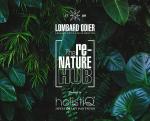rethink sustainability
Zero-Hour Sessions at COP26: Investing in nature at scale

As the COP26 climate summit continued on Thursday in Glasgow, Lombard Odier presented the latest in our series of Zero-Hour Sessions exploring nature, policy and the path to net zero. Titled 'Investing in nature at scale', the fourth session was a convention of the Natural Capital Investment Alliance (NCIA) and Circular Bioeconomy Alliance (CBA) hosted by His Royal Highness The Prince of Wales's Terra Carta Action Forum.
“We all agree that the opportunity to reverse the damage we have done to nature is closing fast,” said Hubert Keller, Senior Managing Partner at Lombard Odier Group, in his opening remarks. “For many years, His Royal Highness has led the way in recognising the existence and extent of the challenge, and what must be done to address it. As an investor, I particularly appreciate His Royal Highness's Davos declaration about the role of finance in solving this challenge, and agree with his sentiment that the problem is not a lack of capital, but how we as an industry are deploying it.”
Watch some key highlights of the event here:
The case for investing in nature
Continuing his opening remarks, Hubert Keller expanded on the need to invest more in our natural capital.
The Natural Capital Investment Alliance (NCIA), of which we are a member, pledged to raise USD 10 billion. At Lombard Odier, we're proud to say that, by the end of 2021, the alliance would have already achieved half of its 2022 objectives around deploying more capital toward nature.1 That said, there is still more work to be done. With 50% of global GDP directly or indirectly reliant on nature2, we're putting the future of our economic prosperity at risk by destroying the most productive asset of our economy. So, how is the rest of our industry doing?
There's now plenty of evidence that investors with direct stakes in our economy are starting to deploy capital in portfolios that are aligned with restoring nature3. In the investment world, asset owners and managers with close to USD 130 trillion in investments have declared a net zero ambition4, indicating a clear and growing realisation that we cannot ignore this crisis.
However, we still need to do more to align the capital we deploy such that we do not breach our planetary boundaries, of which the most widely known is that of limiting global warming to below 1.5 °C. But there are also several other such challenges that we must address, such as ending deforestation and biodiversity loss. And to address these challenges through capital, we need to invest in nature, leaner forms of industry and the circular bioeconomy.
“Consumers are demanding fairer products, which is also forcing companies to build more resilience into their supply chains,” said Keller. “Today, we'll talk about some of the new technologies and solutions that are unlocking the potential of circularity, which is still supporting too little of our economy. But with the right investments at the right scale, it could grow dramatically and unlock a big opportunity.”
Keller also spoke about the growth of the carbon market, which makes an outstanding case for investing in natural capital. “We believe that, by 2030, the voluntary carbon market could be worth one to USD 200 billion, which would go a long way to developing the global south as an economic superpower,” he said. “As such, we're very excited about the opportunity to implement His Royal Highness's vision that lies before us, which consists of connecting three dots: capital sitting on the sidelines, a strong case for investing in nature, and developing the global south. If we can seize this opportunity, we will have taken a significant step towards a net-zero, nature-positive, inclusive economy.”
Rethinking the economy
In the second part of the Session, Hubert joined panellists Tony O'Sullivan, Founding Partner of Pollination; Dr Marc Palahí, Director of the European Forestry Institute; Nathalie Seddon, Professor of Biodiversity and Director of the Nature-Based Solutions Initiative at The University of Oxford; and Professor Lee White CBE, Minister of Forests, Oceans, Environment and Climate Change for the Gabonese Republic; for a conversation on the transition to a nature-positive economy moderated by Nik Gowing, Co-Director of Thinking the Unthinkable.
Professor Seddon began the discussion by emphasising the scientific case for investing in nature. “Over half of global GDP is dependent on a healthy ecosystem,” said Professor Seddon. “But at this rate, we're on track to reach 2 degrees of warming by the end of the century. This would bring significant species losses and, in turn, huge supply chain, resilience, financial and market risks. But there is a solution available right now: invest in protecting, restoring and reconnecting with nature.”
Concurring with Professor Seddon, Dr Palahí called for new thinking to deliver the solutions we need. “We need to restore and sustainably manage our bio-circular system to produce the kinds of food, services and other bio-based solutions that will decarbonise our economy. And we have the science and technology to bring them to life. There are many opportunities to use nature in this way in, for example, the construction, chemical and packaging sectors. In the fashion industry, we can help solve the problem of microplastics by using sustainably sourced wood to make textiles. The one thing we lack enough of—but which I can see growing—is the wisdom to do it.”
Crucially, when it comes to investing in natural capital, there is some low-hanging fruit that the private sector has yet to pluck, as Professor White pointed out. “Over the last three decades, Gabon has drastically improved forest governance, sustainable development and other policies, to the point where 30% of the country is now protected,” explained Professor White. “That transition is down to effective political leadership, which has made Gabon the most carbon-positive nation on the planet. Even so, I have yet to see much private sector interest in coming to Gabon and helping us do even better. We're having a lot of conversations about investing in nature, but the action has yet to materialise.”
Other topics covered by our panellists included why we need to invest in and work with local people to build a nature-positive economy, the importance of getting companies interested in nature-based products to build the skills we need, and how more science and better metrics can help effect change.
1 https://www.lombardodier.com/contents/corporate-news/media-releases/2021/january/hsbc-pollination-climate-asset-m.html
2 https://www.lombardodier.com/home/rethink-sustainability/investing-in-our-natural-capital.html
3 https://www.lombardodier.com/home/rethink-sustainability/investing-in-our-natural-capital.html
4 https://www.gfanzero.com/press/amount-of-finance-committed-to-achieving-1-5c-now-at-scale-needed-to-deliver-the-transition/
Wichtige Hinweise.
Die vorliegende Marketingmitteilung wurde von der Bank Lombard Odier & Co AG oder einer Geschäftseinheit der Gruppe (nachstehend “Lombard Odier”) herausgegeben. Sie ist weder für die Abgabe, Veröffentlichung oder Verwendung in Rechtsordnungen bestimmt, in denen eine solche Abgabe, Veröffentlichung oder Verwendung rechtswidrig wäre, noch richtet sie sich an Personen oder Rechtsstrukturen, an die eine entsprechende Abgabe rechtswidrig wäre.
Entdecken Sie mehr.






teilen.